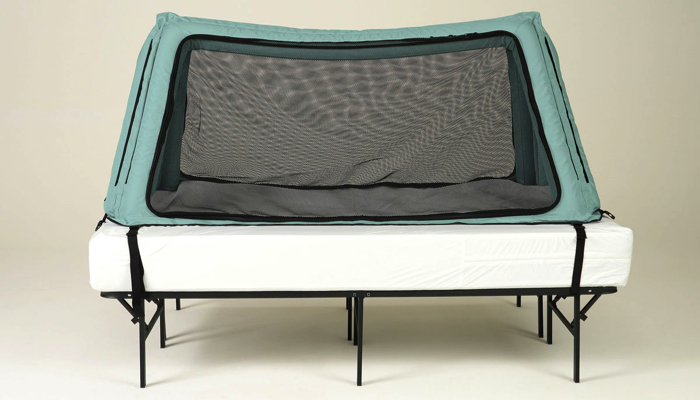5 Sleep Tips for Moms of Newborns

Life with a newborn can be exhausting, to say the least. The constant diaper changes and feeds can feel overwhelming. Not getting a full night’s sleep can compound that overwhelming feeling.
The stomach of a newborn baby is too small for them to be able to physically sleep through the night without feeding, so there is no way around night wakings for the first few months. As a Pediatric Sleep Coach, my general rule is that once a baby has reached 6 months or 15 lbs, they can physically sleep through the night; it’s just a matter of teaching them how.
It is incredibly important for us as new moms to take care of ourselves, and the best place to start is with getting as much sleep as you can while navigating life with a newborn. I know from first-hand experience how difficult sleep deprivation can be as a new mom, and I really feel for those moms who are struggling with it.
But here’s the good news! There are ways for you and your baby to begin getting the sleep you both need! Here are my top 5 tips for new mothers to maximize their sleep with a newborn.

1. Frequent Feeds During the Day for Longer Stretches at Night
Newborns do need to eat frequently. During the first few weeks, feeding on demand works really well. But generally, after the first 2 weeks, newborns tend to do best with a feed schedule spaced out every 2.5 to 3 hours during the day.
Newborns will typically give you one longer stretch of sleep within a 24-hour window. And by longer, I mean over the 3 hours that you’re seeing during the day. Would you rather have that long stretch of sleep during the daytime or at night?
If you’re like me, you’ll be shouting “night, please!” To encourage that longer stretch to be at night, you’ll want to be sure to be feeding your baby at least every 3 hours during the daytime, meaning 3 hours from the start of one feed to the start of the next.
Yes, you may need to wake your sweet slumbering little one from a nap. If they’re still sleeping by the time it’s been 3 hours since the start of their last feed, you can gently wake them to begin their next awake window with a full feed.
2. Partner at Bedtime
We talked about how newborns can give you that one longer stretch of sleep within a 24-hour window. If you’re following tip number one and doing those frequent daytime feeds, that longest stretch is typically the first stretch of the night after you put them down for bed.
If you have a partner at home with you, have your partner put your baby down at bedtime. If you’re a nursing mom, you can give your baby the last feed of the day and then hand them over to your partner to put down for bed. And this is bedtime for you, mama, so that you can maximize your longest stretch of sleep at night!

3. Beware of Blue Light
I remember when my daughter was a newborn and waking up frequently at night. I would fly out of bed to go nurse her. While I nursed her at night, I would have my phone with me and watch a show (I’ll always associate Downton Abbey with those sleepless nights!). My daughter would fall back asleep, and I’d go back to bed too. And even though I was beyond exhausted, it usually took me well over 30 minutes to go back to sleep.
Why? Because I was on my phone, exposing myself to blue light and loud noise. Blue light is the worst color of light when it comes to our sleep. What blue light does is suppresses our body’s melatonin levels, which is the hormone that makes us naturally sleepy. And if your body’s hormone levels aren’t where they need to be, it’s going to make it a lot more challenging to go back to sleep.
So as much as you’re tempted to, try to resist the urge of turning on the TV or getting on your phone while your baby eats at night. It will make it much easier for you to get back to sleep once your baby is done eating.

4. Catch Some Sleep During the Day If You Can
As an adult, your body needs about 8 hours of sleep within a 24-hour window to thrive. Check out The Importance of Sleep to learn why your body needs that much sleep. The best sleep is going to be that wonderful consolidated sleep at night. But since you’re waking up to feed your little one at night, it’s just not always going to be possible.
You can shift some of those hours of much-needed sleep into the daytime if you didn’t get all 8 at night. When your baby naps, you can get some more sleep yourself.
But newborn naps can be VERY unpredictable. I get it! They’re going to range between 20 minutes to over 2 hours.
In general, their best and longest nap of the day is going to be their first nap. That’s probably when you’re feeling the most fatigued as well after not getting a full night’s sleep. So this is going to be your best opportunity to catch some daytime zzzs yourself. If you can, expect to take a morning nap and leave those chores and phone calls you need to make to later in the day.

5. Teach Your Baby Sleep Independence
If your baby is waking up less than every 3 hours at night, listen up! Newborns are too young to learn how to completely self-soothe on their own and still do need some assistance to fall asleep. However, you can help babies learn independent sleep skills from a really early age. Your baby will learn to consolidate their night sleep much faster once they have learned how to fall asleep without the assistance of sleep props such as rocking or feeding to sleep.
Everyone from newborns to adults goes through multiple sleep cycles when we sleep. For newborns, sleep cycles are very short, about 20 minutes long. And when we transition from one sleep cycle into the next, we all come to the surface of sleep.
As adults, we have had years of practice and have perfected transitioning into the next sleep cycle. But for babies who rely on “sleep props” to drift off into dreamland. When they come to the surface of sleep in between sleep cycles, they’re going to realize things aren’t right. They’re not in your arms anymore being fed. They’re now all alone in their crib. And how do you think they’ll respond? They won’t be happy about it! They’ll begin crying out for you to come and help them back to sleep.
You can help your newborn begin to develop independent sleep skills by putting them down drowsy, but awake.
Sleep Is Essential for You and Your Baby
You don’t have to sacrifice your health and well-being just because you decided to become a parent. It is possible to maximize your sleep and teach your child how to sleep well from day one. And it is never too early or too late to start.
Hopefully following my 5 tips will help you (and your baby) get some much-needed sleep during your baby’s first few months. Getting enough sleep yourself will help you be the best possible mom, partner, and friend. And if you are ever at a loss and need help creating a plan to get yourself or your baby sleeping well, don’t hesitate to reach out for help!

Related Posts

Sleep, Special Needs
Safe Place Bedding Travel Bed Review
Traveling with a special needs child can be stressful! Having a safe, durable, and easy to use travel bed can make traveling so much easier!

Sleep, Special Needs
Sleep Regimen for Premature Babies: Special Considerations
It can take premature babies much longer than their full-term peers to sleep for long stretches. A preemie sleep schedule may encourage better sleep.

Sleep
Mastering the Bedtime Routine: 3 Tips for a Peaceful Night’s Sleep
From around six weeks, a newborn bedtime routine can help your baby learn the difference between day and night and prepare for a restful night’s sleep.